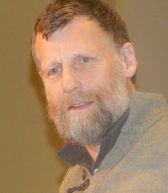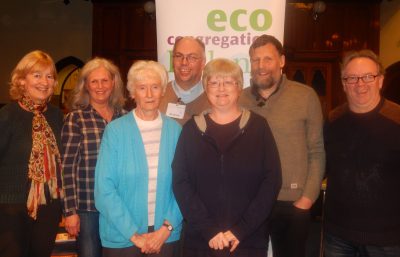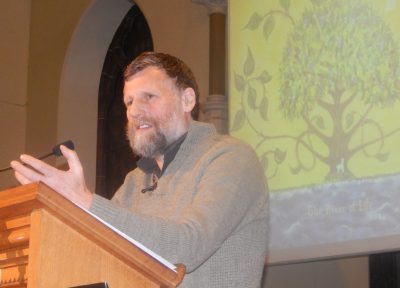 A Scottish environmentalist, author and broadcaster has called on churches in Ireland to take action against climate change in light of the recent “unprecedented” weather.
A Scottish environmentalist, author and broadcaster has called on churches in Ireland to take action against climate change in light of the recent “unprecedented” weather.
Dr Alastair McIntosh was speaking in Fitzroy Presbyterian Church, Belfast on 28th February. Over 100 people came to hear the thought-provoking ecologist, including clergy and lay people from all the mainstream churches. Eco-Congregation Ireland was delighted to co-host this event with Fitzroy’s Caring for Creation Group.
Alastair, who is Fellow of the Centre for Human Ecology in Glasgow and has appeared on Radio Ulster’s Sunday Sequence programme a number of times, said the recent storms that have hit Ireland and the UK were consistent with Met Office expectations of “more extreme events as a result of climate change”. He said: “This is why, as the Labour party leader in Britain put it recently, facing up to climate change is now a national security issue.”
Alastair called on churches to lead the way in taking practical action and asking what could be done to defuse our consumerist lifestyle – one of the main drivers of greenhouse gas emissions to the environment: “The task before us is to be participants in the healing of the nations, of the earth and of our churches. These tasks are all one.”
He said: “Climate change is real, it is happening, it is dangerous and it requires something that goes beyond ordinary political and economic redress. It involves nothing less than a spiritual engagement, and my suggestion tonight is that that spiritual engagement is not just for the healing of the nations, but also for the healing of the churches …. I believe that the issues constellated around climate change – war, poverty, all of these things in our time – are a spiritual stimulus to wake us up.
 “To be an eco-congregation is about far more than just natural environment in a narrow sense. To be an eco-congregation is to be involved in the ‘ekos’ – the same Greek word that gives us ‘ecology’, that gives us ‘ecumenical’, that give us ‘economics’ – and it means ‘the household’. And it doesn’t mean ‘the household’ in a small domestic sense, or even in the sense of the whole world: it means our positioning in the household of the whole of Creation, our positioning in the cosmos. “
“To be an eco-congregation is about far more than just natural environment in a narrow sense. To be an eco-congregation is to be involved in the ‘ekos’ – the same Greek word that gives us ‘ecology’, that gives us ‘ecumenical’, that give us ‘economics’ – and it means ‘the household’. And it doesn’t mean ‘the household’ in a small domestic sense, or even in the sense of the whole world: it means our positioning in the household of the whole of Creation, our positioning in the cosmos. “
Alastair went on to talk about the importance of churches becoming resilient. He said: “The practical nuts and bolts of church life [eg, recycling and energy conservation] is, in fact, a brilliant training ground for learning about resilience … and connecting that to your wider community so that the church takes on a fresh relevance as a centre of knowledge for wider communities – one that is not doing it for the money but doing it for God. Having well-informed energy officers attached to your church who can give practical advice is a very important step to take in this kind of work.
“For eco-congregations, the most important resilience is not just of eco-systems or of knowledge, it is above all about resilience of the spirit, it is above all about the soul .… Church has to be about community, not just within its own small congregation but within the ‘ekos’, within the household, the whole parish … the neighbourhood.”
Alastair said that one of the things he loved about the Eco-Congregation movement was that it was bringing people together “across the divides”. He said: “Let us take from each other’s traditions what we can share and celebrate …. We can drink from our own wells and also share the water with those who have other wells and that is the richness that is held out to us. To me, this is ‘the healing of the nations’ (Ezekiel 47).
 “The practicalities of our heating systems and our recycling in our churches, in our homes, in our businesses – through the incarnation become as much part of the spiritual world and the spiritual work as prayer itself is. Indeed, I put it to you that the only way we can do this work and be sustained and not become drained by it or bored by it … the only way we can do that is by understanding these things as prayer lived out – that is an extension of the eucharist, that is about treating the matter and spirit of this world with reverence, with respect. And that is what starts to shift our consciousness, that is what starts to take the stone out of our hearts and restore a right respectful relationship with one another, with our environment, with ourselves. That is what shifts green consciousness and that is the element that is lacking in mainstream political debate that is all concerned with the politics and the money, but is failing to see that we are facing a ‘kairos’ point in time at the moment and climate change is our spiritual wake-up call.”
“The practicalities of our heating systems and our recycling in our churches, in our homes, in our businesses – through the incarnation become as much part of the spiritual world and the spiritual work as prayer itself is. Indeed, I put it to you that the only way we can do this work and be sustained and not become drained by it or bored by it … the only way we can do that is by understanding these things as prayer lived out – that is an extension of the eucharist, that is about treating the matter and spirit of this world with reverence, with respect. And that is what starts to shift our consciousness, that is what starts to take the stone out of our hearts and restore a right respectful relationship with one another, with our environment, with ourselves. That is what shifts green consciousness and that is the element that is lacking in mainstream political debate that is all concerned with the politics and the money, but is failing to see that we are facing a ‘kairos’ point in time at the moment and climate change is our spiritual wake-up call.”
You can hear a recording of Alastair’s talk by clicking this link.
Alastair McIntosh is Honorary Senior Fellow in the College of Social Sciences at the University of Glasgow, a Fellow of the Schumacher Society and a Research Fellow at the School of Divinity (New College), University of Edinburgh. He has written a number of books, including Radical Human Ecology: Intercultural and Indigenous Approaches (Ashgate, 2012), Rekindling Community: Connecting People, Environment and Spirituality (Green Books 2008), Hell and High Water: Climate Change, Hope and the Human Condition (Birlinn, 2008) and Soil and Soul: People versus Corporate Power (Aurum Press, 2001, 2004).
To find out more about Alastair McIntosh, see his website here.
